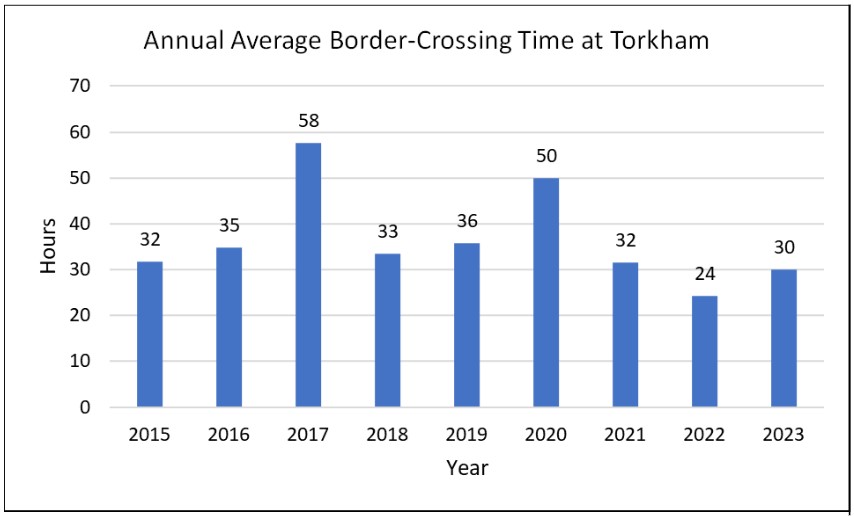Pakistan is transforming cross-border trade with a digital gateway called the Pakistan Single Window (PSW). By digitizing paper-heavy border procedures, PSW makes it easier, faster, and cheaper for businesses to import and export. With over a million declarations already processed, PSW is not just a national success, it’s a showcase for CAREC countries pursuing greener, smarter trade facilitation.
Across Central Asia and South Asia, border-crossing procedures remain a major bottleneck for trade. Complex documentation, overlapping regulations, and inefficient coordination between border agencies increase delays and costs, especially for landlocked CAREC countries. These inefficiencies discourage trade, create opportunities for corruption, and inflate the carbon footprint of regional supply chains.
Pakistan, a CAREC member since 2017 and a key transit country with seaports and maritime sector, has long struggled with fragmented border management. Traders often needed to visit multiple government offices, file duplicate paperwork, and wait days for clearances. This outdated system discouraged SMEs from entering international markets and hindered regional integration goals. In addition, the border-crossing at Torkham (a gateway border post for Afghanistan Transit Trade and also for access to Central Asia) has shown a very long duration in the period 2015 to 2023. The average consistently stayed above 30 hours (except 2022). The long delay is due to the need to submit many documents and the lack of digital infrastructure to perform risk-based management.

In today’s interconnected digital economy, such inefficiency is unsustainable. CAREC’s vision of a seamless, low-carbon, and interoperable trade corridor demands digital reforms. That’s where the Pakistan Single Window comes in.
The PSW is a secure, digital platform that allows cross-border traders to submit documents and data through a single entry point. Established under the Pakistan Single Window Act of 2021 and led by Pakistan Customs, the platform has integrated 24 public-sector agencies, 29 banks, and key private sector players. In addition, PSW is integrated with e-Phyto Hub, and has successfully completed integration with Tajikistan Customs for electronic exchange of data on bilateral trade.
This modernization initiative aims to simplify compliance, reduce transaction costs, and eliminate the need for paper-based manual processes. But more importantly, PSW is building the foundation for real-time digital coordination between CAREC countries by enabling interoperability with other national single windows and global trade systems. For example, PSW can potentially integrate with Kazakhstan’s Astana-1 system to exchange trade data.
The transition to digital trade facilitation is complex. Pakistan faced resistance from institutions used to manual processes and had to overcome low digital literacy among some border officials and traders. Connectivity gaps in remote areas also made system roll-out uneven.
Another challenge was harmonizing data standards across agencies with incompatible legacy systems. Creating a single risk management framework, where agencies share data to collectively assess and manage trade risks—required extensive coordination and legal reforms.
Yet despite these hurdles, PSW’s leadership prioritized inclusive user design, multilingual interfaces, and capacity building. They also created TradeVerse, a digital portal offering access to over 900 trade laws and procedures to help users navigate the system.
The Asian Development Bank has supported Pakistan’s trade facilitation agenda under the broader CAREC Program and regional connectivity initiatives. PSW too has benefitted from ADB’s technical assistance and as a leading electronic trade facilitation platform in the region, PSW aligns with several ADB priorities:
- CAREC’s Regional Improvement of Border Services (RIBS) projects helped modernize infrastructure at key border-crossing points such as Torkham and Chaman and also provided funding for establishing a dedicated data centre for PSW in Karachi.
- ADB’s emphasis on digitalization, climate-smart logistics, and paperless trade builds the ecosystem in which platforms like PSW thrive.
- ADB also promotes regional knowledge sharing on customs automation and cross-border regulatory harmonization—efforts directly reinforced by PSW’s expansion into interoperability with PRC, Uzbekistan, and Tajikistan.
PSW’s role in reducing emissions from port congestion and idle freight movements also aligns with ADB’s growing climate agenda in transport and trade.
Without digitized border processes, CAREC countries risk falling behind in global trade. The longer trucks wait at the border, the more fuel they burn, and the more competitive advantage is lost. PSW offers a scalable, climate-smart solution that reduces trade friction while contributing to decarbonization.
Its real success lies in its replicability. By cutting clearance times, improving compliance, and enabling cross-border data sharing, PSW is a blueprint for digital reform in CAREC. The platform is already delivering over USD 430 million in annual transaction cost savings.
With continued collaboration across the region, single windows like PSW can become the backbone of a digitally integrated, low-carbon CAREC corridor.
Credits: This article contains contributions by:
Mr. Syed Aftab Haider, Chief Executive Officer, Pakistan Single Window (PSW)
